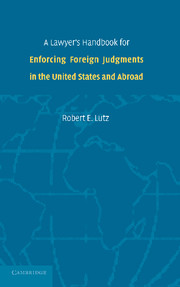Book contents
- Frontmatter
- Contents
- Preface
- Acknowledgments and Dedication
- Introduction
- PART ONE ENFORCING FOREIGN COUNTRY JUDGMENTS IN THE UNITED STATES
- PART TWO ENFORCEMENT OF JUDGMENTS ABROAD
- I Overview
- II How to Identify and Select Foreign Counsel
- III Documentation for Enforcement
- IV Understanding Foreign Enforcement Frameworks
- V Conclusion
- Bibliography
- Instruments, Laws, and Other Materials
- PART THREE THE FUTURE OF ENFORCING FOREIGN JUDGMENTS
- Bibliography
- Index
IV - Understanding Foreign Enforcement Frameworks
Published online by Cambridge University Press: 16 November 2009
- Frontmatter
- Contents
- Preface
- Acknowledgments and Dedication
- Introduction
- PART ONE ENFORCING FOREIGN COUNTRY JUDGMENTS IN THE UNITED STATES
- PART TWO ENFORCEMENT OF JUDGMENTS ABROAD
- I Overview
- II How to Identify and Select Foreign Counsel
- III Documentation for Enforcement
- IV Understanding Foreign Enforcement Frameworks
- V Conclusion
- Bibliography
- Instruments, Laws, and Other Materials
- PART THREE THE FUTURE OF ENFORCING FOREIGN JUDGMENTS
- Bibliography
- Index
Summary
GENERAL
Identifying and selecting a FLC or foreign counsel abroad is only the first step in obtaining foreign recognition of a U.S. judgment. Informed and effective representation of a U.S. plaintiff seeking enforcement of an award overseas rests upon your understanding of other countries' enforcement systems. Other countries' frameworks for converting foreign awards to local awards for enforcement purposes share many common aspects. Most jurisdictions' applicable statutes or treaties bar judicial review of the merits of the underlying adjudication, but, as in the U.S., foreign jurisdictions have established some type of recognition proceeding granting the foreign court jurisdiction to determine whether a judgment rendered overseas can be converted to a domestic judgment. Foreign recognition, paralleling enforcement of foreign country money judgments in the U.S., commonly requires:
A final U.S. judgment;
That the rendering court had proper jurisdiction over the defendant;
That standards of due process, including fraud, often defined by the law of the country where enforcement is sought, were not violated in the U.S. adjudication;
That the underlying adjudication, including the law applied by the adjudicating court, is not offensive to the public policy of the country where enforcement is sought; and
Reciprocity, which means at a minimum the adjudicating jurisdiction has given res judicata or claim preclusion effect to judgments from the jurisdiction where enforcement is sought, or, at a minimum, a legal framework is in place that poses no impediments to enforcing such a judgment.
This section gives an overview of four major enforcement frameworks in countries where enforcement of a U.S. judgment is frequently sought and provides a guide for U.S. practitioners to follow in obtaining overseas recognition, enforcement, and execution of a U.S.-rendered judgment.
- Type
- Chapter
- Information
- Publisher: Cambridge University PressPrint publication year: 2006



